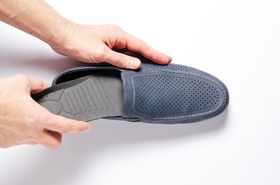The Effectiveness of Cortisone Injections for Plantar Fasciitis
Updated December 12, 2024

Often, many individuals who suffer from heel pain may have a common foot condition called plantar fasciitis, an inflammatory condition that affects the plantar fascia (the band of tissue running under the foot and connecting the heel bone to the toes). There are many supposed treatments for such conditions, including the use of cortisone injections in your heel, but how effective is this method of treatment?
What Is a Cortisone Injection?
Cortisone injections are also called corticosteroid injections, which are basically an artificial version of the hormone cortisol. Therefore, "cortisone" and "steroid" have no difference, but you shouldn't confuse the two with illegal anabolic steroids that are designed to increase muscle mass. Cortisone is a type of steroid that lowers inflammation, leading to less pain.
How Does a Cortisone Shot Help Plantar Fasciitis?
Plantar fasciitis is an inflammatory condition, and cortisone injections help by reducing the inflammation and pain for a temporary period. It is important to note that many foot conditions are caused by biomechanical dysfunctions of the foot. Thus, getting a cortisone shot is not a cure for plantar fasciitis.
The moment the positive effects of the cortisone shot start wearing off, the symptoms will start showing up if the cause of the disease has not been treated. This makes it neccessary to undergo a holistic treatment approach of physical therapy, podiatry, orthotic use, and other conservation treatment options.
How Long Does a Cortisone Shot Last in the Foot for Plantar Fasciitis?
The positive effects of cortisone shots typically last between 3 weeks and 3 months, but might last longer in certain circumstances. It all depends on the mg of cortisone given in one shot and the type of cortisone (long-acting or short-acting). Though if your cortisone shot for plantar fasciitis didn't work, you should know within the next few days.
Depending upon the stage of your plantar fasciitis (acute, sub-acute, or chronic), level of pain, and the results of prior conservative treatments, the general practitioner would decide on the injection dose, injection technique, and frequency of further injections.
Cortisone injections are usually only given only in chronic conditions with severe pain and after conservative treatment options have failed after 6-9 months.
For proper aftercare for your plantar fasciitis steroid injection, It is recommended to stay off your foot for about 30-60 minutes after the cortisone shot, and heavy exercises and overactivity should be avoided for the next 24-48 hours to reduce the recovery time and risk of bruising, pain, and other side effects.
What Are the Risks of Cortisone Injections in the Foot?
Initially, cortisone injections in the foot hurt considerably due to there being less soft tissue compared to the other body parts like the buttocks.
It is important to keep in mind that there are risks to every medical procedure, and plantar fasciitis steroid injections are no different. The risk of side effects from plantar fasciitis steroid injections increases with a higher injection dose and frequency, and are listed below:
- Heel fat pad atrophy
- Plantar fascia rupture
- Damage to the cartilage of the ankle and foot joints
- Infection of the joints
- Damage to the nerves of the foot
- Weakening of the tendons
- Thinning of the skin and other soft tissues around the site of the injection
- Osteoporosis of the surrounding bone
- Discoloration of the skin around the injection area
- Bruising and swelling
- Temporary aggravation in pain and inflammation of the joint
Are Cortisone Shots for Plantar Fasciitis Worth It?
Cortisone injections have always been a controversial topic of discussion. In order to give accurate advice, you have to consider the pros and cons of cortisone shots for plantar fasciitis, such as the high risk they present alongside their temporary benefit of potentially only a few weeks.
Therefore, it is recommended to go for cortisone shots only if all the other conservative management has failed after 6-9 months of doing it regularly, and only if your chronic condition is flaring up with a debilitating effect.








